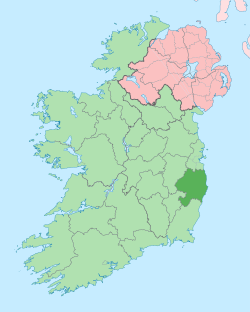Arklow
Arklow (/ˈɑːrkloʊ/; ARK-loh; from Old Norse Arnkell-lág, meaning 'meadow of Arnkell',[3] Irish: An tInbhear Mór, meaning "the great estuary") is a town in County Wicklow on the east coast of Ireland, overlooked by Ballymoyle hill. It was founded by the Vikings in the ninth century. Arklow was the site of one of the bloodiest battles of the 1798 rebellion. Its proximity to Dublin led to it becoming a commuter town with a population of 13,163 as of the 2016 census.[1]
Arklow An tInbhear Mór | |
|---|---|
Town | |
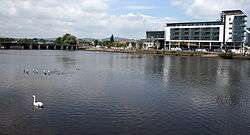 Avoca River and Bridgewater Shopping Centre | |
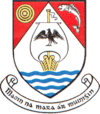 Coat of arms | |
| Motto(s): Maoin na mara ár muinighin Our hope lies in the riches of the sea | |
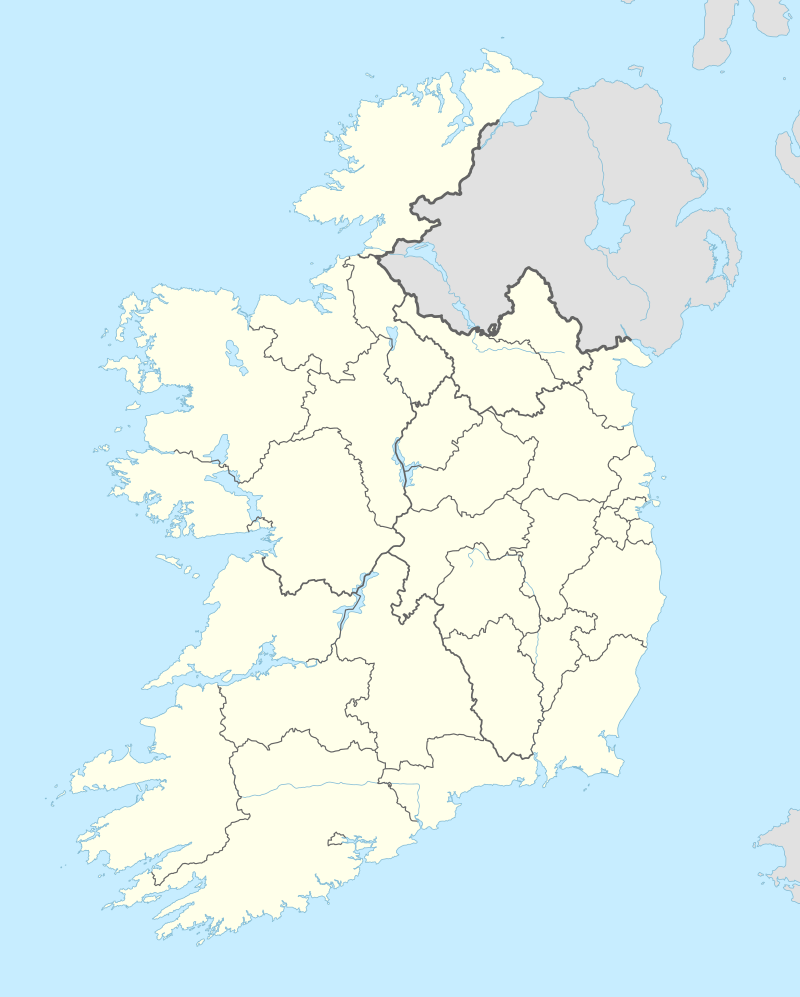 Arklow Location in Ireland | |
| Coordinates: 52.7941°N 6.1649°W | |
| Country | Ireland |
| Province | Leinster |
| County | County Wicklow |
| Elevation | 20 m (70 ft) |
| Population | |
| • Town | 13,163 |
| • Urban | 12,989 |
| Irish Grid Reference | T240735 |
| Website | www |
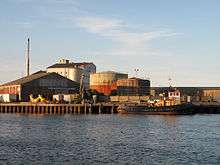
Arklow is at the mouth of the River Avoca (formerly Avonmore), the longest river wholly within County Wicklow. The town is divided by the river, which is crossed by the Nineteen Arches Bridge, a stone arch bridge linking the southern or main part of the town with the northern part, called Ferrybank. The Nineteen Arches Bridge is the longest handmade stone bridge in Ireland, and a plaque on the south end of the bridge acknowledges this.

History
| Year | Pop. | ±% |
|---|---|---|
| 1821 | 6,226 | — |
| 1831 | 6,511 | +4.6% |
| 1841 | 6,237 | −4.2% |
| 1851 | 6,122 | −1.8% |
| 1861 | 6,257 | +2.2% |
| 1871 | 6,377 | +1.9% |
| 1881 | 5,213 | −18.3% |
| 1891 | 4,482 | −14.0% |
| 1901 | 4,944 | +10.3% |
| 1911 | 5,042 | +2.0% |
| 1926 | 4,535 | −10.1% |
| 1936 | 4,680 | +3.2% |
| 1946 | 4,915 | +5.0% |
| 1951 | 5,203 | +5.9% |
| 1956 | 5,292 | +1.7% |
| 1961 | 5,390 | +1.9% |
| 1966 | 6,083 | +12.9% |
| 1971 | 6,948 | +14.2% |
| 1979 | 8,451 | +21.6% |
| 1981 | 8,646 | +2.3% |
| 1986 | 8,388 | −3.0% |
| 1991 | 7,987 | −4.8% |
| 1996 | 8,557 | +7.1% |
| 2002 | 9,959 | +16.4% |
| 2006 | 11,712 | +17.6% |
| 2011 | 13,009 | +11.1% |
| 2016 | 13,163 | +1.2% |
| Sources: [4][5][6][1] | ||
The town's English name derives from Arnkell's Lág (Arnkell was a Viking leader; a "lág" (low) was an area of land). Its Irish name, Inbhear Mór or An tInbhear Mór, means the large estuary. It is also known in Irish as Inbhear Dé, from the River Avonmore's older name, Abhainn Dé. Historically it was a major seafaring town, with both the shipping and fishing industries using the port, with shipbuilding also being a major industry.
After the arrival of the Anglo-Normans, their leader Theobald Walter, ancestor of the Earls of Ormonde, was granted the town and castle of Arklow by King Henry II. In 1264 the Dominicans were granted a large tract of land, which is now known as Abbeylands, and they built an abbey, which became known as the Priory of the True Cross or Holy Cross Abbey.
Some time after 1416, the Manor of Arklow came into the control of the MacMurrough Kings of Leinster, possibly after the death of the 4th Earl of Ormonde in 1452. In 1525, Muiris Kavanagh (McMurrough, King of Leinster 1522–31) returned the manor and castle of Arklow and its lands to his nephew Piers Butler, the Earl of Ormonde.
During the Wars of the Three Kingdoms, in September 1649, Oliver Cromwell arrived at Arklow on his way to Wexford and took the surrender of the town. In 1714, James Duke of Ormonde sold the Manor of Arklow to John Allen of Stillorgan, County Dublin. In 1750, Allen's eldest granddaughter, Elizabeth Allen, married John Proby, who was raised to the peerage in 1752 as Baron Carysfort of County Wicklow and came into possession of the Arklow Estate.
On 9 June 1798, the town was the scene of one of the Battle of Arklow, one of the bloodiest battles of the 1798 rebellion, when a large force of Wexford rebels attacked the town in an attempt to spread the rising to Dublin but were repulsed by the entrenched British forces with huge slaughter.
Education
There are eight primary schools located around the town, including one Gaelscoil.[7]
There are four secondary schools serving the town, which are St. Mary's College, St.Kevin's C.B.S., Glenart College and Gaelcholáiste na Mara.[7]
Transport and communications
Road
The M11 from Dublin to Rosslare bypasses Arklow between junctions 20 and 21. A 16.5 km upgrade to the N11 between Arklow and Rathnew began in April 2014 and was completed in July 2015. This connected the then existing M11 Arklow Bypass with the existing M11 Rathnew/Ashford Bypass creating motorway from Dublin to Gorey. This project also included the construction of a service area on the M11 Northbound, just north of Gorey, with direct access from the M11 Southbound via an overpass.
Rail
Rail connections are provided by Iarnród Éireann along the Dublin-Rosslare railway line, including commuter and intercity services in and out of the capital.[8] There is also a train to Dundalk available daily. Arklow railway station opened on 16 November 1863.[9]
Bus
Bus Éireann provides several routes through Arklow, including the 002, 005, 133 and 384 services.[10] In addition, Wexford Bus operates several services day and night linking Arklow with Dublin Airport.[11]
Economy
Industry
In 1884, Charles Stewart Parnell rented Big Rock townland from his cousin William Proby, Earl of Carysfort, and commenced quarrying. Parnell was also a supporter of the Arklow harbour scheme. The Parnell quarries closed in the 1920s.
In the early part of the 20th century, a large munitions factory, Kynoch, was established on the north side of the town. This factory employed several thousand workers during the First World War but closed shortly after it, all production being moved to South Africa. 17 workers were killed in an explosion at Kynoch in 1917. The town is also known for its pottery (which eventually closed after first being taken over by Noritake) and for its shipbuilding industry.
In the 1960s, a state-owned fertiliser factory, Nitrogen Éireann Teoranta, later Irish Fertiliser Industries, was established on the outskirts of the town. This factory complex comprised a number of chemical plants and manufactured a range of fertilisers from basic raw materials. It closed in 2002.
There is still an industrial base in Arklow, with Servier remaining as one of the manufacturing companies in Arklow. Allergan formerly had a plant locally, but this closed in 2009.[12][13] In 2009, Elavon, a credit card processing company, purchased a new business site at Arklow Business Park.[14]
Shipping and shipbuilding
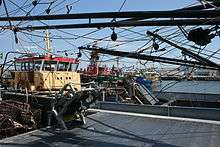
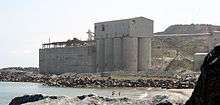
The former national sail training vessel Asgard II was built by John Tyrrell & Son Ltd in Arklow. Another John Tyrrell & Son boat, Gipsy Moth III, was sailed to victory by Francis Chichester in the 1st Single-Handed Trans-Atlantic Race in 1960. His time of 40 and 1/2 days was 16 days faster than the previous record crossing.[15] Recent times have seen large reductions in both cargo and fishing. The town remains the headquarters of Arklow Shipping, numerically the largest shipping company in Ireland, which maintains a fleet of 56 cargo ships and a division in Rotterdam in the Netherlands.[16]
Retail
Arklow services a large catchment area (including a number of surrounding towns and villages) and has approximately 32,000m² of retail space.[17] As of 2018, approximately 20% of this retail space was vacant.[18] Among the town's largest retail centres is the Bridgewater Shopping Centre, which opened in 2007 and was sold in 2016 for €33.25 million.[19]
Environment
Water quality
As of 2007, the River Avoca was classified as "seriously polluted" by the Irish EPA[20] as a result of the discharge of sewage directly into the river[21] in addition to a long history of industrial pollution in the area from early mining operations and more recent chemical industries. In previous centuries, Arklow was renowned for oyster beds, however, these were destroyed over a century ago by pollutants from mining operations flowing down the river into the estuary.
Raw effluent from the town still travels through the drainage system built in the 1930s, and enters the River Avoca untreated via several sewage outfall pipes along the river. A sewage treatment plant has long been proposed for the area, and was first awarded planning permission in 1993.[22] This was challenged unsuccessfully to An Bord Pleanála, however subsequently no funding arrived from government,[23] and the planning permission lapsed. A further ten-year planning permission was granted in 1999.[24] This too was unsuccessfully challenged to An Bord Pleanála, with conditional planning approval given in 2005.[25] As of 2019, planning permission was again confirmed for a "high-tech" waste water treatment facility.[26]
Services and development
A recycling centre is located in one of the town's industrial estates. It is run by Wicklow County Council.[27]
A few kilometres into the Irish Sea is the Arklow Bank Wind Park. Opened in 2004, this wind farm is made up of a test of seven GE 3.6 MW machines, with 106m turbines.
Sports
The local Gaelic football club, Arklow Geraldines Ballymoney GAA, was founded in 1999 and is based at Pearse Park. Arklow Rock Parnells GAA club, founded in 1953, is primarily involved in hurling and camogie and plays at Parnell Park.
The town's association football clubs include Arklow Town F.C. (founded in 1948), Arklow United F.C. (Ferndale Park),[28] and Arklow Celtic F.C. (Celtic Park).[29]
Arklow Rugby Club plays its home games at The Oval, and Arklow Rowing Club is based on the town's South Quay.
There is a 18 hole links golf course at Arklow Golf Club (founded 1927).[30]
Music
To many foreign music fans, Arklow is best known as the title setting for Van Morrison's 1974 song "Streets of Arklow", one of eight songs he wrote on a three-week vacation back to Ireland, and featured on his album Veedon Fleece. The "Battle of Arklow" is a hornpipe and non-traditional set dance tune, and is often played at feiseanna and other Irish dance competitions.[31] Arklow is also the home town of pop group Moloko's lead singer Róisín Murphy. The Arklow Silver Band were featured on the track Red Hill Mining Town by U2, on their 1987 album The Joshua Tree. The "Arklow Music Festival" is held in the town annually. It was established in 1970. The festival lasts a week and it involves people coming to compete from all around the country. They compete in solo forms and group forms.[32]
Culture
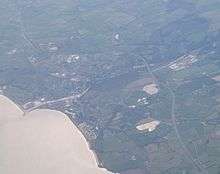
The Seabreeze festival is a three-day event in mid-July.[33] The festival includes a number of live shows and events at various venues throughout the town, ending in a fireworks display.
Arklow has been both the birthplace and place of residence for many artists such as George Campbell who was born there son of the self-taught artist Gretta Bowen.[34]
The seaside town has also been the backdrop for artists and philosophers such a Ludwig Wittgenstein who frequented the town for its beaches, sunsets and lighting conditions. Later Avoca village, about 10 km from Arklow, was popularised in the T.V. show Ballykissangel, drawing visitors from abroad who come to see where the show was filmed.
Arklow was visited by artists such as Lilian Davidson, A.R.H.A. born in Bray in 1893 died 1954, who painted subjects such as Jack B. Yeats, Sarah Purser, 'AE' George Russell, and poet Austin Clarke. Davidson would visit the town regularly, and during her trips she drew many sketches and painted scenes of the town and beaches. One such work, The Netter, Arklow depicts a scene of a man repairing a net by the harbourside with the harbour in the background; on the reserve-side of the painting is a sketch of children playing on the south beach.
Percy French, artist and poet, was also known to visit Arklow and Avoca so much so that he married there. He made many sketches and wrote poems describing his feeling for the place.
Politics and government
In local government Arklow and the surrounding areas has six councillors on Wicklow County Council, representing the Arklow Municipal District.[35] Arklow is part of the Wicklow constituency for national elections and referendums, and the South European Parliament constituency for European elections.
Twin towns
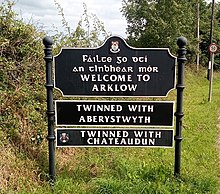
Arklow is twinned with:


People
- Aaron Barry, professional footballer player[38]
- Garrett Byrne, Irish nationalist and MP (1829–1897)
- George Campbell, artist and writer[39]
- Ron Delany, won Ireland's last gold medal in track and field at the 1956 Olympics in the 1500m[40]
- Erik O'Eir, South African born artist
- Ciarán Hyland, Wicklow Gaelic footballer[41]
- Teresa Kearney, teacher, Franciscan Sister, and missionary[42]
- Nicky Kelly, politician and former Mayor of Arklow[43]
- Richard le Blond, 14th century judge
- James Moore, professional boxer[44]
- Róisín Murphy, singer-songwriter[45]
- Oisín Stack, actor[46]
- Mervyn Travers, Wicklow Gaelic footballer
- Kate Tyrrell, shipping company owner and captain of the Denbighshire Lass (1863–1921)[47]
References
- "Sapmap Area - Settlements - Arklow". Census 2016. Central Statistics Office. April 2016. Retrieved 28 March 2020.
- "Sapmap Area - Former Legal Town - Arklow Legal Town". Census 2016. Central Statistics Office. April 2016. Retrieved 28 March 2020.
- Field, John (1980). Place-names of Great Britain and Ireland. Newton Abbot, Devon: David & Charles. p. 25. ISBN 0389201545. OCLC 6964610.
- airo.maynoothuniversity.ie
- Histpop
- "Settlement Arklow Legal Town And Its Environs (CSO Area Code ST 15009)". Census 2011. Central Statistics Office. April 2011. Retrieved 28 March 2020.
- "Education". Arklow.ie The Official Guide to Arklow. Archived from the original on 16 March 2011. Retrieved 15 January 2009.
- "Dublin-Rosslare-Dublin Timetable" (PDF). Irish Rail. Archived from the original (PDF) on 7 September 2014. Retrieved 28 March 2011.
- "Arklow station" (PDF). Railscot – Irish Railways. Retrieved 8 September 2007.
- "List of Bus Éireann timetables". Bus Éireann. Retrieved 12 June 2014.
- "Wexford-Dublin Airport Express". Wexford Bus. Archived from the original on 22 January 2009. Retrieved 14 January 2009.
- "360 Allergan jobs in Arklow to go by 2009". RTÉ. 30 January 2008. Retrieved 1 January 2008.
- "Allergan closes doors on Irish plant". pharmafile.com. 8 May 2009. Retrieved 28 March 2020.
- "Elavon commits to Arklow by purchasing site off IDA". Retrieved 12 June 2012.
- Chichester, Francis (1979). Alone across the Atlantic (1st American pbk. ed.). New York: D. McKay. ISBN 0679509011.
- "About Us". Arklow Shipping Limited. Retrieved 26 June 2020.
- Chapter 6 - Centres and Retail (PDF). Wicklow County Development Plan 2016‐2022 (Report). Wexford County Council. 2006.
Arklow is the main centre located in the south of the County [..and..] provides for the service needs of its residents and a large geographical catchment extending to Avoca, Aughrim, Redcross, a significant rural population [..] Arklow currently has approximately 32,000m² of net retail space (including vacant units)
- "Big business is needed to revive town". Wicklow People. Independent News & Media. 13 April 2018. Retrieved 28 March 2020.
- "Goldman Sachs buys Bridgewater Shopping Centre in Arklow". irishtimes.com. Irish Times. 11 June 2016. Retrieved 28 March 2020.
- "Water Quality of Rivers" (PDF). EPA (Ireland). Archived from the original (PDF) on 14 December 2010.
Avoca River [..was..] once again classified as seriously polluted when assessed in 2007
- "Arklow Sea Scouts". Arklow Sea Scouts. 2011. Archived from the original on 1 October 2011. Retrieved 5 August 2011.
- Wicklow County Council Planning Enquiry Archived 27 September 2007 at the Wayback Machine
- Seanad Éireann – Volume 160 – 19 October, 1999 – Adjournment Matter. – Water and Sewerage Schemes Archived 18 November 2007 at the Wayback Machine
- Wicklow County Council Planning Enquiry Archived 27 September 2007 at the Wayback Machine
- "Green light for Arklow sewerage plant". RTÉ News. 25 January 2005.
- "Planning permission granted for Arklow Waste Water Treatment plant". wicklownews.net. 6 August 2019. Retrieved 28 March 2020.
- "Arklow Recycling Centre". Wicklow County Council. 2007. Archived from the original on 1 February 2009. Retrieved 14 January 2009.
- "Soccer player airlifted to hospital". Wicklow News. Retrieved 31 May 2020.
- "Arklow Celtic are defeated by St Patrick's Boys AFC". Carlow and District Juvenile League. Retrieved 31 May 2020.
- "Arklow Golf Club". Arklow Golf Club. Retrieved 20 May 2020.
- "list of acceptable set dances". The Congress of Irish Dance Teachers. Retrieved 31 May 2020.
- "Arklow Music Festival". www.arklowmusicfestival.com.
- "Festival - Sunday 7th July to Sunday 21st July 2019". arklowseabreezefestival.ie. Retrieved 28 March 2020.
- Kate Newman, Frederick George Campbell (1917 - 1979), Dictionary of Ulster Biography. Accessed 20 May 2020.
- "Arklow Municipal District councillors". www.wicklow.ie. Wicklow County Council.
- "Arklow link sees Aber twinned with fourth partner". cambrian-news.co.uk. Retrieved 12 April 2018.
- "Town Twinning". Wicklow Co Co. Retrieved 20 May 2020.
- "Aaron Barry makes First Division switch following Cork City departure". the42.ie. The42. 19 November 2019. Retrieved 15 August 2020.
- "Frederick George Campbell (1917 - 1979)". Dictionary of Ulster Biography. Ulster History Circle. Retrieved 15 August 2020.
- "Ronnie honoured in his hometown". Bray People. Independent News & Media. 24 December 2016. Retrieved 15 August 2020.
- "Ciaran scores big money on TV show". Wicklow People. Independent News & Media. 2 June 2009. Retrieved 17 August 2020.
- "Mama Kevina, 'flame in the bush'". History Ireland. Vol. 14 no. 4. August 2006.
- "RTÉ Archives - Nicky Kelly Returns Home - 1984". rte.ie. RTÉ. Retrieved 17 August 2020.
- "Arklow boxer has his sights firmly set on a world title". Wicklow People. Independent News & Media. 10 August 2007. Retrieved 17 August 2020.
- "Róisín Murphy: 'Here I am. Warts and all'". irishtimes.com. Irish Times. 8 July 2016. Retrieved 17 August 2020.
- "'It isn't a social commentary' - 'Redwater' priest hits back at 'Oirish' jibes". independent.ie. Independent News & Media. 16 May 2017. Retrieved 17 August 2020.
- "Pioneering sea captain Kate to be celebrated". Wicklow People. Independent News & Media. 17 February 2018. Retrieved 17 August 2020.
External links
| Wikimedia Commons has media related to Arklow. |
